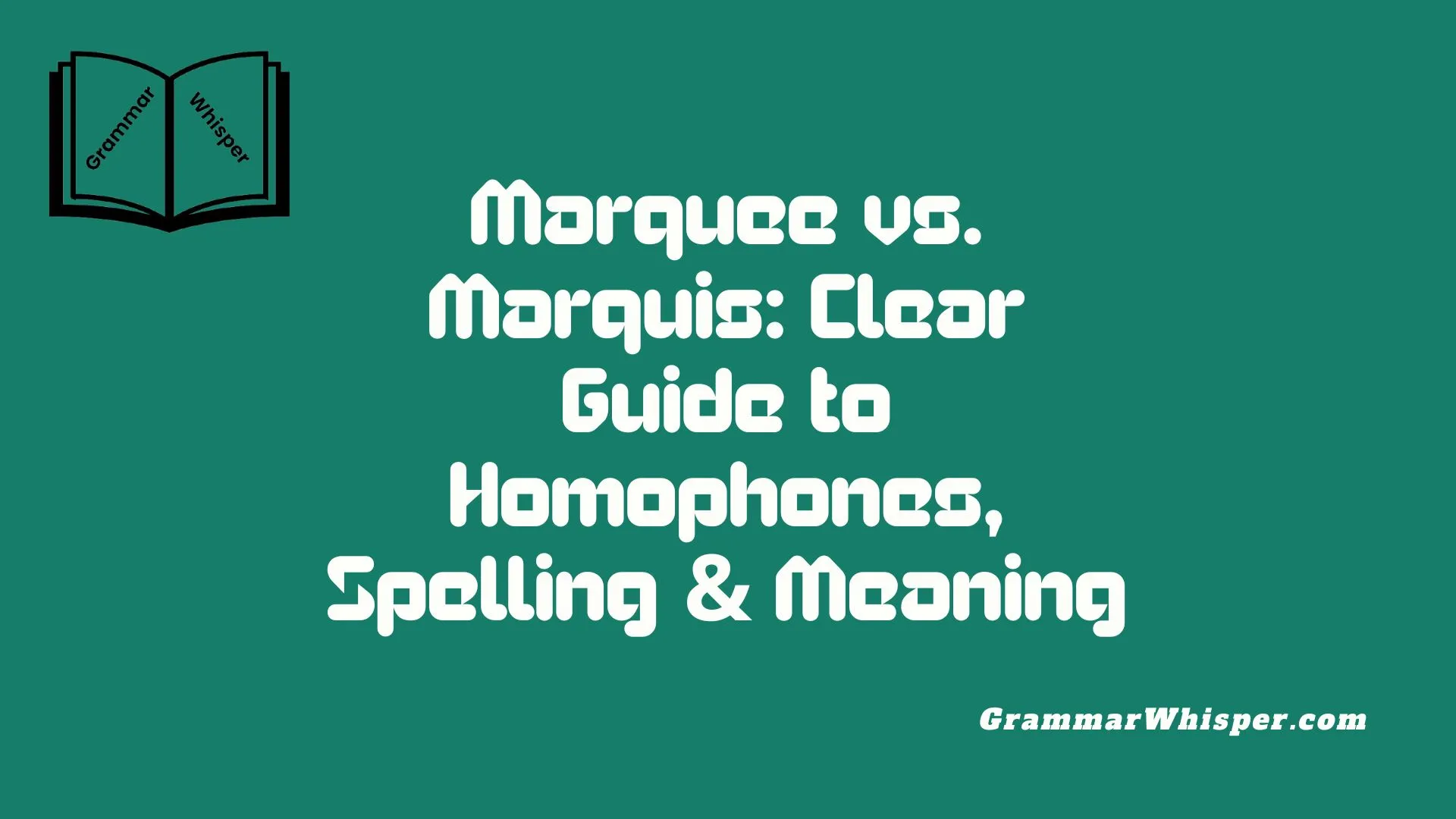Many people learning English or improving as a writer or speaker run into trouble with tricky homophones – words that sound the same but carry different meanings and spellings. Marquee vs. Marquis are a great example. Though their pronunciation is nearly identical, their uses, origins, and definitions couldn’t be more different. A marquee might be a tent, theater sign, or something grand and attention-grabbing. A marquis, on the other hand, ties to nobility in European history – a title, not a structure.
To communicate more clearly and confidently, it’s worth mastering the distinctions between the two. In my own writing, I used to constantly confuse them. That changed when I found a comprehensive guide packed with useful examples, sharp explanations, and practical tips. That experience helped me see the context clearly, and since then, my language feels more precise. Learn the details of marquee vs. marquis, and you’ll never hesitate again.
What Is a Marquee? Meaning and Common Uses
Definition of Marquee
A marquee is typically a large tent used for outdoor events or a prominent signboard placed outside theaters, cinemas, or venues to display names or announcements. It’s a word with French origins, coming from marquise, but it has evolved distinctly in English.
Usage of Marquee in North American English
In the U.S. and Canada, the word marquee most often refers to the illuminated sign over a theater or cinema entrance. These signs proudly display the titles of movies, shows, or events. For example:
“The movie title was displayed brightly on the marquee.”
The marquee serves as a key promotional tool in entertainment, catching the attention of passersby.
Usage of Marquee in British English and Events
In British English, marquee primarily means a large tent used for outdoor weddings, parties, and events like Thanksgiving gatherings or summer festivals. It’s less about signage and more about shelter and event space.
“We booked a marquee for the garden wedding reception.”
Real-World Examples of Marquee Usage
| Region | Context | Example Sentence |
| North America | Theater sign | “The theater’s marquee flashed the film’s premiere date.” |
| United Kingdom | Event tent | “The summer festival set up a giant marquee in the park.” |
What Is a Marquis? Meaning and Historical Background
Definition of Marquis
A marquis is a noble title historically used in European aristocracy. It ranks below a duke but above an earl or count. The term originated in medieval France and was used to denote a noble who ruled a border territory known as a march.
Historical Context of Marquis
The title marquis was especially prominent in France and parts of Europe during the Middle Ages and Renaissance. Marquises governed border regions to defend kingdoms, which is why their role carried significant military and political weight.
“The Marquis of Queensberry is famous for creating the rules of modern boxing.”
This title has a rich legacy connected to governance, defense, and noble status.
Marquis vs. Marquess: Regional Variations
The British equivalent of marquis is spelled marquess, but both refer to the same noble rank. The pronunciation varies slightly:
- Marquis (pronounced “mar-kee”) is commonly used in France and in American English when referring to the title.
- Marquess (pronounced “mar-kwis”) is the preferred term in British English.
Both terms hold the same social rank, but regional differences in spelling and pronunciation are important to remember.
Examples of Marquis in Sentences
| Region | Context | Example Sentence |
| Europe (France, UK) | Noble title | “The marquis attended the royal court.” |
| United Kingdom | Historical title | “The marquess managed several estates in the countryside.” |
How to Avoid Confusing Marquee and Marquis
The two words, marquee and marquis, often puzzle people because of their similar pronunciation. Here’s how to keep them straight:
Key Spelling Differences
- Marquee ends with “-ee” and usually relates to signs or tents.
- Marquis ends with “-is” or the British “-ess” variant and refers to nobility.
Pronunciation Nuances
- Marquee is pronounced “mar-kee.”
- Marquis is pronounced “mar-kee” (American) or “mar-kwis” (British).
Context Clues
If you’re reading or writing about entertainment, events, or signage, marquee is the right word. For discussions about aristocracy, history, or noble titles, use marquis or marquess.
Examples Table: Marquee vs. Marquis in Sentences
| Word | Context | Example Sentence | Region |
| Marquee | Theater sign | “The movie title was displayed on the marquee.” | North America |
| Marquee | Event tent | “They set up a marquee for the wedding party.” | United Kingdom |
| Marquis | Noble title | “The Marquis of Queensberry established boxing rules.” | Europe |
| Marquess | Noble title (UK) | “The Marquess owns several estates.” | United Kingdom |
Summary: Mastering the Difference Between Marquee and Marquis
Understanding the difference between marquee vs. marquis helps you write with clarity and authority. Remember:
- Use marquee for signs and tents.
- Use marquis (or marquess in the UK) for noble titles.
- Watch for regional variations in spelling and pronunciation.
- Context always guides your choice.
With these tips, you’ll confidently choose the right word every time. Clear communication is just a word away.
Quote to Remember: “Precision in language is the bridge between confusion and understanding.” – Linguistic Expert
Practical Tips for Writers
- When unsure, ask: Is it about a sign/tent or nobility? That question narrows the choice fast.
- Read your sentences aloud. If it sounds like a venue or event, it’s likely marquee. If it sounds aristocratic or historical, it’s marquis.
- Use reliable dictionaries or grammar resources for verification when writing formal content.
Final Thoughts
Distinguishing between marquee and marquis might seem like a small detail, but it’s one that can make a big difference in your writing. Whether you’re referencing an elegant outdoor tent or a noble title from European history, choosing the right word shows your command of the English language. These homophones not only sound similar but also bring with them very different meanings, histories, and cultural contexts.
By understanding their definitions, usage across regions, and common sentence patterns, you’re better equipped to avoid mistakes and communicate with clarity. Use this guide as a reference whenever you come across these terms in your writing or reading. With a strong grasp of marquee vs. marquis, you’re one step closer to mastering nuanced English vocabulary.
FAQs
What is the difference between “marquee” and “marquis”?
Marquee refers to a large tent or a sign over a theater or venue. Marquis, on the other hand, is a noble title ranking below a duke and above an earl. They are homophones but not interchangeable.
Is “marquess” the same as “marquis”?
Yes, both refer to the same noble rank. Marquess is the British spelling, while marquis is used in French and American contexts. Pronunciations may also vary slightly by region.
Can “marquee” be used to describe a celebrity?
Yes, in informal American English, “marquee name” is sometimes used metaphorically to refer to a famous celebrity or headliner, especially in entertainment.
Are “marquee” and “marquis” pronounced the same?
They are often pronounced the same in American English: mar-kee. In British English, “marquess” is usually pronounced mar-kwis. Despite similar sounds, meanings are different.
Why are homophones like these tricky in English?
Homophones sound the same but have different meanings and spellings. They’re tricky because they rely on context for clarity, and small spelling differences can carry entirely different implications, especially in formal or academic writing.











